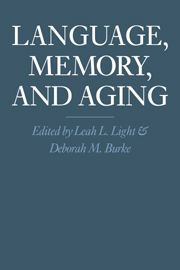Book contents
- Frontmatter
- Contents
- List of contributors
- Preface
- 1 Theories of information processing and theories of aging
- 2 Effects of aging on verbal abilities: Examination of the psychometric literature
- 3 Aging and individual differences in memory for written discourse
- 4 Geriatric psycholinguistics: Syntactic limitations of oral and written language
- 5 Aging and memory activation: The priming of semantic and episodic memories
- 6 Automatic and effortful semantic processes in old age: Experimental and naturalistic approaches
- 7 Integrating information from discourse: Do older adults show deficits?
- 8 Comprehension of pragmatic implications in young and older adults
- 9 Capacity theory and the processing of inferences
- 10 Age differences in memory for texts: Production deficiency or processing limitations?
- 11 Episodic memory and knowledge interactions across adulthood
- 12 The disorder of naming in Alzheimer's disease
- 13 Language and memory processing in senile dementia Alzheimer's type
- 14 Patterns of language and memory in old age
- Author index
- Subject index
6 - Automatic and effortful semantic processes in old age: Experimental and naturalistic approaches
Published online by Cambridge University Press: 05 January 2012
- Frontmatter
- Contents
- List of contributors
- Preface
- 1 Theories of information processing and theories of aging
- 2 Effects of aging on verbal abilities: Examination of the psychometric literature
- 3 Aging and individual differences in memory for written discourse
- 4 Geriatric psycholinguistics: Syntactic limitations of oral and written language
- 5 Aging and memory activation: The priming of semantic and episodic memories
- 6 Automatic and effortful semantic processes in old age: Experimental and naturalistic approaches
- 7 Integrating information from discourse: Do older adults show deficits?
- 8 Comprehension of pragmatic implications in young and older adults
- 9 Capacity theory and the processing of inferences
- 10 Age differences in memory for texts: Production deficiency or processing limitations?
- 11 Episodic memory and knowledge interactions across adulthood
- 12 The disorder of naming in Alzheimer's disease
- 13 Language and memory processing in senile dementia Alzheimer's type
- 14 Patterns of language and memory in old age
- Author index
- Subject index
Summary
The study of aging and cognition has, not surprisingly, relied on experimental paradigms and theoretical frameworks developed within experimental psychology. Thus much of the research on aging, particularly aging and memory, follows an experimental psychology tradition that has been called “general principles memory research, by which is meant a search for principles or generalizations and their underlying mechanisms and processes” (Bruce, 1985, p. 78). The general principles approach in memory research has been questioned recently by critics who contend that it has yielded accounts of performance on artificial, laboratory tasks designed to test theories, but little insight into memory functioning in everyday life (Hirst & Levine, 1985; Neisser, 1976, 1978, 1982, 1985). Neisser suggests, “If X is an interesting or socially significant aspect of memory, then psychologists have hardly ever studied X” (Neisser, 1978, p. 4).
Memory decline in old age is unquestionably an “interesting” and “socially significant aspect of memory.” The approach of general-principles memory research to this problem has yielded an impressive progression of methodologically rigorous studies that attempt to identify mechanisms underlying memory decline. However, testing of proposed mechanisms has occurred primarily within the laboratory. Further, the starting point for this research is generally a specific principle identified in young adults and tested within a particular experimental paradigm. As a result, this approach has yielded aging research that tends to involve a limited repertoire of experimental tasks (see Kausler, 1985, for a discussion of this problem).
- Type
- Chapter
- Information
- Language, Memory, and Aging , pp. 100 - 116Publisher: Cambridge University PressPrint publication year: 1988
- 16
- Cited by



